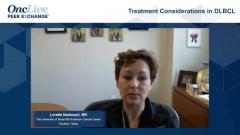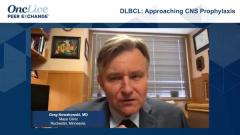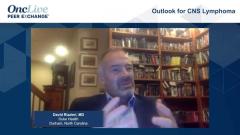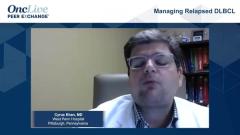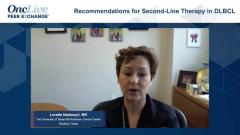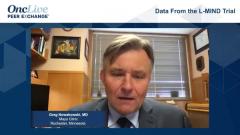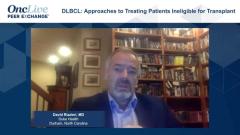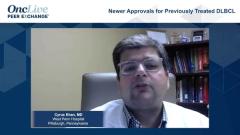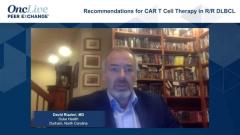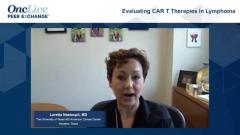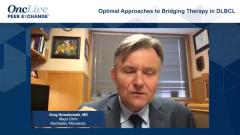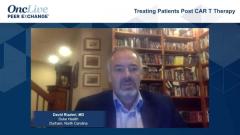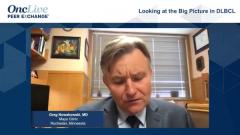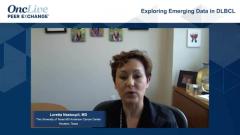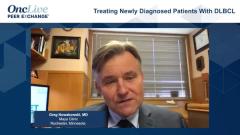
DLBCL: Approaches to Treating Patients Ineligible for Transplant
Key opinion leaders highlight treatment approaches for patients with DLBCL (diffuse large B-cell lymphoma) who are ineligible for transplant.
Episodes in this series

John Leonard, MD: Antibody-drug conjugates (ADCs) are getting a lot of play. We have them in Hodgkin lymphoma, T-cell lymphoma. We now have polatuzumab in DLBCL, and David, your take on it for this population, the polatuzumab BR (abbreviation for bendamustine plus rituximab) regimen, which I think, even quite surprisingly in a small study, had an overall survival (OS) benefit and a higher response rate (RR) to the addition to BR. Is that a regimen you use? What's your take on that combination?
David Rizzieri, MD: I think it's interesting for a few reasons. One is the target: We have a CD79B (B-cell surface antigen) target here, and as some know, that's a component of the B-cell receptor (BCR) complex, so it can affect downstream BCR signaling. And then you have this conjugated to MMAE, the monomethyl auristatin E agent, which we're used to seeing on other ADCs (antibody-drug conjugates), so this agent can induce apoptosis through multiple mechanisms—ADCC (antibody-dependent cellular cytotoxicity), ADCP (antibody-dependent cellular phagocytosis, and direct on that AE, so it's very attractive in that regard. The other reason I'm interested in it is, not for nothing, we're thinking about these patients who are really beat up. They've been through multiple regimens, and they often are cytopenic, have liver toxicity and renal insufficiency, and we should remember bendamustine is hydrolyzed in the liver and excreted in the biliary tree. It doesn't have to go through metabolism, excretion, et cetera, so for an older, sicker patient, it's an agent that is quite safe in our armamentarium, so I think it's a nice combination for this group of patients in need. In terms of the data, as you were pointing out, John, we have a lot of interesting data. Laurie Sehn, MD, MPH, Vancouver, Canada presented an update from the pola-BR (abbreviation for polatuzumab plus rituximab) studies at ASH (American Society of Hematology Annual Meeting and Exposition) this year, and it's a follow-up with the GACO paper from last year. They continue to show improvement in all of the clinically relevant end points for BR plus or minus polatuzumab with progression-free survival (PFS) improved, even an overall survival (OS) benefit, almost 12.5 versus about 5 months in the non-Pola arm. So, I think that's an encouraging step forward for a population of patients in need of new targeted approaches.
John Leonard, MD: Before we move to the third-line setting and beyond, Loretta, any other approaches beyond these that have fallen into your armamentarium for this group of people? It seems like we had nothing, and now—chemotherapy, or maybe these patients would get single-agent lenalidomide in the past, or maybe rituximab in the past, but palliative. Any other things that you use for a second line, say, older patient, or frailer patient who can't get through a transplant? These seem like pretty reasonable alternatives.
Loretta Nastoupil, MD: Yeah, I think particularly in the last year, we've just seen an explosion of the treatment landscape. I would say prior to that, we had participated in the lenalidomide-rituximab-ibrutinib study, and again, my general sense is it works better in the non-GCB (germinal center B-cell) patients, but that was an option for people who, again, I felt were poor candidates for chemotherapy or intensive approaches. I echoed the comments that you made earlier. My optimism around third-line chemotherapy is super low, so I'd much rather try a targeted approach. There's always maybe a small portion, but they have really good outcomes, and it's very well tolerated, so I'm happy to see that these targeted approaches, again albeit more novel, newer strategies, are effective for a good portion of patients.
TRANSCRIPT EDITED FOR CLARITY


